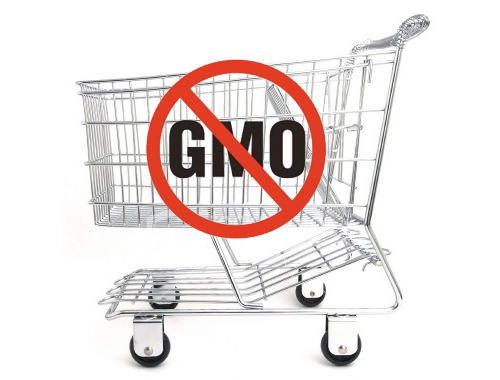
"The coming year promises to bring about a greater, more pervasive awarenes" of the genetically modified organisms (GMOs) in our food supply, wrote Group Editor Robert Vosburgh, in a trade publication that conventional food executives and retailers use as a primary source of news and trends in the industry. Vosburgh describes how previous food "culprits" like fat and carbs "can even define the decade in which they were topical," and suggests that GMOs may finally burst through into the public awareness and join their ranks.
Vosburgh credits two recent launches with "the potential to spark a new round of concern among shoppers who are today much more attuned to the ways their food is produced." One is our Institute's new non-GMO website, which, he says, "provides consumers with a directory of non-GMO brands . . . developed for the 53% of Americans who say they would avoid GMOs if labeled.'"
The other launch is the Non-GMO Project, offering "the country's first consensus-based guidelines, which include third-party certification and a uniform seal for approved products. . . . The organization also requires documented traceability and segregation to ensure the tested ingredients are what go into the final product."
He alerts supermarket executives that, "the growth of the organic (which bans GMO ingredients), local and green product categories reflects a generation of consumers who could be less tolerant of genetic modification."
Please allow me to sit back with an I-told-you-so grin of satisfaction. Two years ago, I wrote a newsletter article describing three components that would move the market on GMOs:
1. The Non-GMO Project's new "widely accepted definition for non-GMO" would spark a GMO cleanout, starting with the brands in the natural food industry.
Our Institute endorses the Non-GMO Project and encourages food companies to enroll their products with this excellent nonprofit organization. Their official seal was introduced in October 2009 and has quickly become the national standard for meaningful non-GMO claims.
2. "Providing clear Non-GMO product choices" with our Non-GMO Shopping Guide would make it easier for consumers to select "non-GMO products by brand and category."
The same Guide is available as a website, a spread in magazines, a pocket guide, a two-sided download, and coming soon, a mobile phone application.
3. "Educating Health-Conscious Shoppers" about the health effects of GMOs is the key means by which GMOs will become a marketing liability—the next culprit.
Past culprits drove the market because of consumer beliefs that were unhealthy. In the same way, evidence demonstrating the health dangers of GMOs is already igniting an anti-GMO fever. In 2009, for example, the prestigious American Academy of Environmental Medicine urged doctors to prescribe non-GMO diets for all patients, based on evidence that GMOs fed to lab animals triggered diseases and disorders.
The prognosis in Supermarket News overlooks critical differences between GMOs and the other culprits. Fats, carbs, salt, and sugar each offer unmistakable consumer appeal. As a result, food companies offer options with them, without them, and at low levels.
Genetically modified (GM) foods, however, don't offer a single consumer benefit. The five major GMOs—soy, corn, cottonseed, canola, and sugar beets—are gene-spliced to either tolerate poisonous herbicides, or produce poisonous insecticides. Consumers never clamor for them.
Also unlike the other culprits, companies can usually eliminate GMOs without even changing recipes. Purchasers can simply instruct suppliers to provide the non-GMO soy and corn derivatives, the non-GMO sugar, etc., as Trader Joe's and Whole Foods have already done for their home brands.
Therefore, when major food companies notice even tiny losses in market share, their GMO cleanout will be widespread. Kraft Foods and others will recognize that the same consumer trend that forced them to remove all GM ingredients in Europe and Japan has reared its head in the States.
Consumer Opinion Already Poised Against Biotech
We're already seeing the momentum build against genetically engineered bovine growth hormone. Wal-Mart, Starbucks, Dannon, Yoplait, and most dairies have shunned the controversial drug that is now synonymous with "increased cancer risk" in the minds of many consumers. (The recent condemnation of the hormone by the American Public Health Association will help nail its coffin shut.)
In the case of GMOs, the proportion of US consumers needed to avoid brands that contain GM soy and corn, etc. is quite small--probably only 5%. That means that the purchasing power (and trend setting ability) of 15 million people or 5.6 million households can turn GMOs into a marketing liability. But when you look at the numbers, no matter how you slice it, they add up to a coming non-GMO tidal wave.
About 28 million health-conscious Americans regularly buy organic. About 87 million are strongly opposed to GM foods and believe they are unsafe. And 159 million say they would avoid GMOs if labeled. While most people do not conscientiously avoid brands with GM ingredients, its usually because they don't know how. That's where our Non-GMO Shopping Guide comes in—disseminated far and wide in 2010.
Vosburgh says that in the food industry, culprits "can even define the decade in which they were topical. In the '80s, it was fat; in the '90s, it was carbs." We won't need a full decade to send GMOs packing. Although I can't forecast the exact timing, I'll wager one prediction. By this time next year, Monsanto—the largest GMO producer—is not going to be happy.
International bestselling author and filmmaker Jeffrey M. Smith is the executive director of the Institute for Responsible Technology. His first book, Seeds of Deception: Exposing Industry and Government Lies About the Safety of the Genetically Engineered Foods You're Eating, is the world's bestselling and #1 rated book on GMOs. His second, Genetic Roulette: The Documented Health Risks of Genetically Engineered Foods, documents 65 health risks of the GM foods Americans eat everyday. Both are distributed by Chelsea Green Publishing. To help you choose healthier, non-GMO brands, use the Non-GMO Shopping Guide.




No comments:
Post a Comment